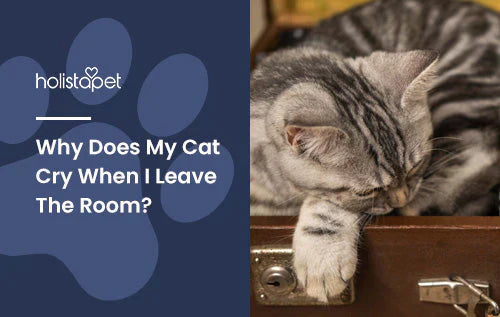Does your cat follow you around and meow incessantly when you try to leave their sight? You're probably wondering: "why does my cat cry when I leave the room? or why does my cat meow when i leave the room" There can be many reasons why your cat might cry when you leave them, but some of the most common ones are separation anxiety, loneliness, and boredom.
As you know, cats are mysterious creatures. Worry not! We've unlocked why your overly attached cat cries when you leave them, along with simple tricks to help your feline companion feel at ease when you're away.
Why Does My Cat Cries When I leave?
Your cat might become nervous when you leave it alone to go about your routine or work schedule, even if it has a pet sitter. If your cat cries when cat meows when i leave or you leave, it's essential to try to identify the root of the problem so that you can begin to fix it. It could have separation anxiety that needs your attention. When a cat spends an extended period alone, they may become lonely. Loneliness is a common reason cats might cry when their owners leave them alone.
Cats are social animals that often enjoy companionship, so if they are the only cat in the home, being left alone for too long may make them bored or lonely. This can lead to destructive behaviors like clawing at furniture or excessive meowing. Boredom is another common reason cats cry when left alone. A bored cat may become restless and cry out for attention. You can help remedy this by providing your cat with plenty of interactive toys, playtime, scratching posts, and an adequate litter box.
Related Post: Warning Signs Your Cat Is Crying for Help [Learn How to Respond]
What Is Separation Anxiety?
Separation anxiety in cats is an emotional response triggered by the separation from a person or companion pet that a cat has a strong bond with. This condition may lead some cats to get agitated and cry when left alone. Cat separation anxiety usually stems from a traumatic experience such as abandonment or a lack of trust or bond between a cat and their guardian.
While every cat has a different personality, cats with separation anxiety will often cry and howl when their owner leaves them alone, as they become incredibly nervous and stressed without their human companion.

Does My Cat Have Anxiety?
Like humans, cats can suffer from skittishness, nervousness, and everything. A psychological trigger, like a traumatic experience, lack of proper socialization, or a history of abuse or neglect, can cause nervousness in your cat. Our own anxiety can also affect a cat's mood and cause them to stress out. Anxiety may also be caused by physical symptoms from illness, exposure to something toxic, or infectious diseases that affect the nervous system.
Your cat may become particularly anxious if there's a sudden change of being left alone for a long time. If your cat is used to being around you most of the time, and that changes, your cat may experience separation anxiety. Typically, cats aren't big fans of change, and a new situation, like being left alone for hours when they're used to being around you, can be very distressing for them. It's not always easy to tell if your cat is anxious, but there are a few things you can watch out for in your cats behavior.
Cats with separation anxiety often make a lot of noise and may behave erratically when triggered. They may pace or have trouble settling down and exhibit destructive behavior. If your cat exhibits any of these signs, it's important to address the issue and seek help from a veterinarian or animal behaviorist. If you adopted a cat during the 2020-2021 global pandemic, the only life they've known might have changed after society opened back up.
You may have started working in an office again, traveling, or taking a vacation, which will take you away from your cat for hours or days at a time. This adjustment will likely affect your cat, and they could start to show signs of separation anxiety.
Signs Of Separation Anxiety In Cats
If you're worried that your cat may have separation anxiety, there are a few signs to look out for. An anxious cat will often behave nervously and be very vocal. There are other less obvious indications of when a cat is suffering from being left alone. Here are some of the most common signs of cat separation anxiety:
Excessive Vocalization
Cats with separation anxiety often cry and howl when their owner leaves them alone. They may also become agitated and restless. A cat meowing excessively usually means it is distressed about something.

Pacing and Restlessness
A cat anxious about being left alone may pace back and forth or become restless and unable to settle down. This can be a sign that the cat is feeling agitated and stressed.
Destructive Behavior
Cats with separation anxiety may become destructive when left alone, clawing furniture, tearing up curtains, or other naughty behaviors. This is often an attempt by the cat to get attention from their owner.
Urinating and Defecating Outside of the Litter Box
If your cat is urinating and defecating inappropriately when left alone, it could signify separation anxiety. It isn't helpful to get upset if your cat does this, as that would likely cause them to have even more anxiety.
Excessive Grooming
Cats may over-groom themselves when stressed, leading to bald patches and skin lesions. This is an attempt to self-soothe when the cat is overly anxious.
How To Help Cats With Separation Anxiety
If you think your cat may be suffering from anxiety, you can do a few things to help them feel better. First, spend more time with your cat and build a stronger bond. You can also try leaving them with toys or a recording of your voice to help ease their anxiety. If your cat is lonely or bored, provide them with plenty of toys and playtime. Here are some great additions that can make a big difference in your cat's daily life:
- A cat tree can give cats a place to climb to feel safe and secure. Cat trees come in various shapes and sizes to fit into any space, giving your cat a safe hideaway.
- Treat balls filled with catnip, which can help calm and distract cats from worrying when you're not with them.
- Window perches can give cats a cozy spot to sit, observe what's happening outside, and see you come home.

CBD Products for Cats
CBD can greatly support your worrisome cat in times of stress. At HolistaPet, our mission is to provide all pets with natural products that can help enrich their lives. Here are some of our favorites:
Catnip Spray with CBD
You may consider using a product like our popular Catnip Spray with CBD, which can help relax and calm cats down. When ingested, catnip acts as an artificial pheromone, which can trigger positive and pleasurable sensations. Our convenient spray contains catnip essential oil blended with 20mg of nano CBD for faster absorption.
It can be sprayed on your cat's bedding, carrier before traveling, or skin if they feel particularly stressed. The spray is non-toxic and safe for cats of all ages, making it a great choice for those who want to help their cat feel more relaxed.
CBD Calming Chews for Cats
Our CBD Calming Chews for Cats is a feline favorite—soft and chewy with a delicious salmon flavor! These easy-to-digest chews are designed to help your cat manage stressful situations and take care of its body and mind. They're made with a calming formula with many natural ingredients that benefit your cat. They are so popular that they're easy to introduce into your cat's diet, and they're packed with all the things cats love in an adorable heart shape.
CBD Oil for Cats
Please get back to basics with our CBD Oil for Cats. Using only two main ingredients (CBD extract and hemp seed oil), our high-quality CBD oil may be added to your cat's food or dropped directly into their mouth for relaxing and balancing effects. It is designed to help heal, protect, and strengthen your pet to live their best lives! Our CBD oil is easy to give your cat whenever they need help. With 150-3000mg strengths, we have CBD oil for cats of all sizes.
Final Thoughts
There can be a few reasons why does my cat go into another room and meow , but some of the most common ones include separation anxiety, loneliness, and boredom. If your cat is exhibiting any signs of separation anxiety, it's essential to try and identify the root of the problem so you can work on fixing it.
With patience and love, you can help your cat overcome any anxiety or loneliness they might be feeling. You can also support their well-being with comforting and calming products from HolistaPet!







![Probiotics For Dogs [Soft Chews] - HolistaPet](http://www.holistapet.com/cdn/shop/files/Probiotic-Infographic-1_472d7a29-e30c-435a-9638-1365d8c3a9f9.jpg?v=1725384841&width=104)



























Leave a comment
All comments are moderated before being published.
This site is protected by hCaptcha and the hCaptcha Privacy Policy and Terms of Service apply.